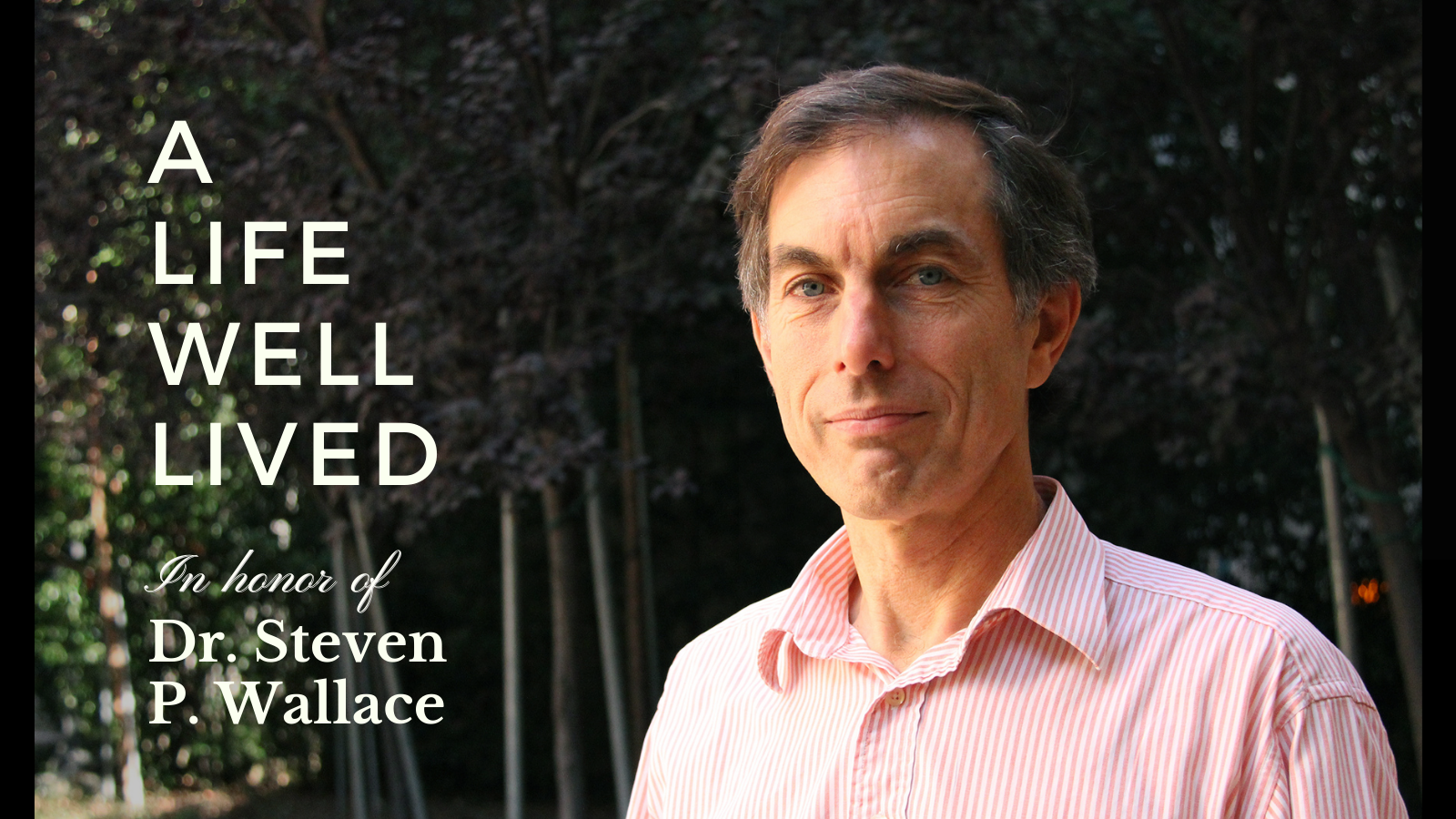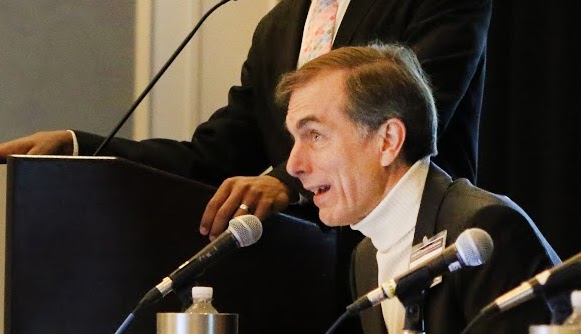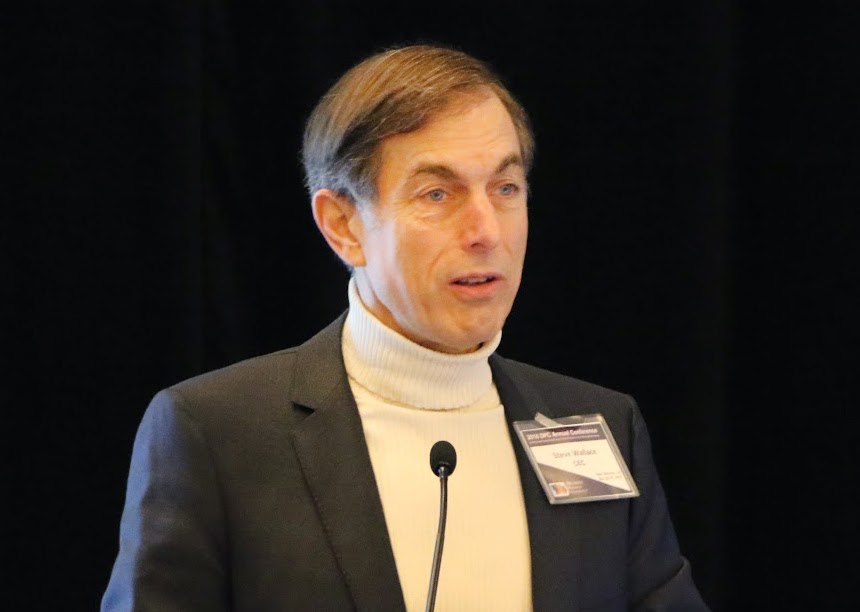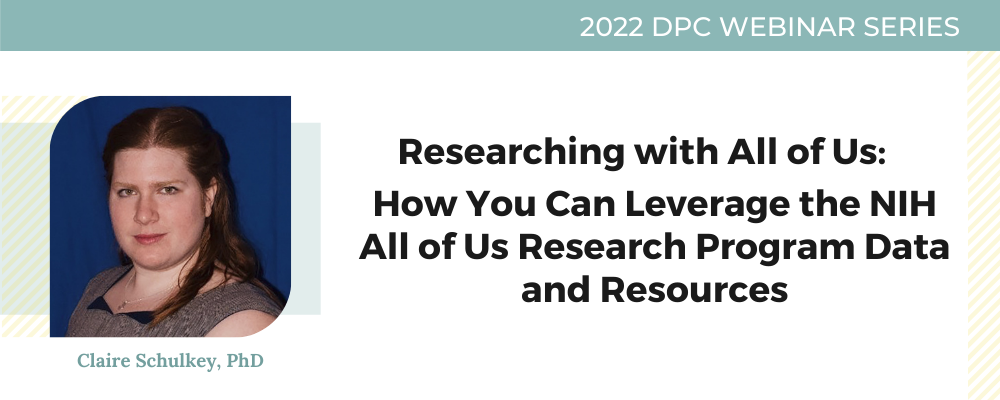Created by Jonathan Mendez, last modified by Jonathan Mendez 24 Mar 2022, at 12:00 AM

Dr. Steven P. Wallace’s legacy is seen through his research and fieldwork in aging in diverse communities and his health advocacy for communities of color and immigrant populations.
Read about Wallace’s legacy here.
Equity

Dr. Wallace was most widely recognized for having developed new approaches to assessing the economic security of older people through the California Elder Economic Security Standard Index (Elder Index), a tool that measures the true cost of living for older adults. It was adopted into California law by way of Assembly Bill 138: Elder Economic Planning Act of 2011, which required Area Agencies on Aging to include the Elder Index in their strategic annual plans and was used by the World Health Organization in its 2020 Decade of Healthy Aging report. With support from different foundations, Dr. Wallace had been working to update and expand the Elder Index to make it relevant for policymakers in the state.
Diversity and Inclusion
 Dr. Wallace was a leading scholar on aging and health issues, identifying social determinants of health inequities in different populations, and public policy and community interventions that can improve health equity. His research has explored disparities in the consequences of health policy changes on racial/ethnic minority elderly, including older Latinos, American Indians/Alaska Natives, Asian-Pacific Islander Americans, and African-Americans. He also introduced the social determinants of health concept into discussions of health and social care long before such ideas became mainstream.
Dr. Wallace was a leading scholar on aging and health issues, identifying social determinants of health inequities in different populations, and public policy and community interventions that can improve health equity. His research has explored disparities in the consequences of health policy changes on racial/ethnic minority elderly, including older Latinos, American Indians/Alaska Natives, Asian-Pacific Islander Americans, and African-Americans. He also introduced the social determinants of health concept into discussions of health and social care long before such ideas became mainstream.
With the support of federal funding, Dr. Wallace and his team developed community-based methods to advance the use of clinical-preventive services among older adults of color, including advocating for better air quality and establishing resources for additional smoke-free rental housing in Los Angeles neighborhoods.
His devotion to public health equity was also reflected in his role as the director of the NIH/NIA-funded national Coordinating Center for the Resource Centers for Minority Research and multi-PI of the NIH funded Diversity Program Consortium (DPC) Coordination and Evaluation Center, two projects that aim to enhance the diversity of the science workforce, starting at the undergraduate level.
Immigration

Dr. Wallace was also an expert on immigrant health and health policy for immigrants. He was nationally recognized for his investigations of aging and the consequences of health policy on immigrant populations and people from the Latinx, American Indian, Alaska Native, Asian, Pacific Islander and African American communities. He served as the PI on two NIH grants that investigate the impact of immigrant policies and access to health care for California adults and children. In particular, the NIH/NIMHD funded Research on Immigrant Health and State Policy Study (RIGHTS), studied how Latin and Asian American Californians were being excluded in health care, social services, employment, education and law enforcement. RIGHTS also studied how state policies promoted barriers to health care and how such experiences influence people’s ability to seek the health care they need.
Publications

Dr. Wallace published research on aging issues, disparities in the consequences of health policy changes on racial/ethnic minority elderly, and immigrant health topics for over 30 years.
He published more than 100 papers for scientific journals, including the American Journal of Public Health, Journal of Gerontology, Archives of Internal Medicine, and Social Science and Medicine. He wrote letters to editors and op-ed articles for local and national newspapers and he authored over 30 book chapters and dozens of policy briefs and reports.
Equity:
Diversity and Inclusion:
-
Kietzman KG, Troy LM, Green CR, Wallace SP. Pathways to Advancing Aging Policy-Relevant Research in Academic Settings. Gerontol Geriatr Educ. 2016;37(1):81-102. doi: 10.1080/02701960.2015.1116069. Epub 2016 Feb 5. PMID: 26849290; PMCID: PMC5056624.
-
Guerrero LR, Ho J, Christie C, Harwood E, Pfund C, Seeman T, McCreath H, Wallace SP. Using collaborative approaches with a multi-method, multi-site, multi-target intervention: evaluating the National Research Mentoring Network. BMC Proc. 2017 Dec 4;11(Suppl 12):14. doi: 10.1186/s12919-017-0085-6. PMID: 29375657; PMCID: PMC5773874.
-
Norris KC, McCreath HE, Hueffer K, Aley SB, Chavira G, Christie CA, Crespi CM, Crespo C, D'Amour G, Eagan K, Echegoyen LE, Feig A, Foroozesh M, Guerrero LR, Johanson K, Kamangar F, Kingsford L, LaCourse W, Maccalla NM, Márquez-Magaña L, Mathur A, Maton K, Mehravaran S, Morales DX, Nakazono T, Ofili E, Okuyemi K, Ott L, Parangan-Smith A, Pfund C, Purnell D, Reynolds A, Rous PJ, Saetermoe C, Snyder K, Vishwanatha JK, Wagler A, Wallace SP, Seeman T. Baseline Characteristics of the 2015-2019 First Year Student Cohorts of the NIH Building Infrastructure Leading to Diversity (BUILD) Program. Ethn Dis. 2020 Sep 24;30(4):681-692. doi: 10.18865/ed.30.4.681. PMID: 32989368; PMCID: PMC7518523.
-
Gutiérrez Á, Guerrero LR, McCreath HE, Wallace SP. Mentoring Experiences and Publication Productivity among Early Career Biomedical Investigators and Trainees. Ethn Dis. 2021 Apr 15;31(2):273-282. doi: 10.18865/ed.31.2.273. PMID: 33883868; PMCID: PMC8054872.
Immigration:
-
Wallace SP, Young MT, Rodríguez MA, Brindis CD. A social determinants framework identifying state-level immigrant policies and their influence on health. SSM Popul Health. 2018 Nov 2;7:016-16. doi: 10.1016/j.ssmph.2018.10.016. PMID: 30581960; PMCID: PMC6293030.
-
Young MT, Leon-Perez G, Wells CR, Wallace SP. Inclusive state immigrant policies and health insurance among Latino, Asian/Pacific Islander, Black, and White noncitizens in the United States. Ethn Health. 2019 Nov;24(8):960-972. doi: 10.1080/13557858.2017.1390074. Epub 2017 Oct 20. PMID: 29052425.
-
Nwankwo EM, Wallace SP. Duration of United States Residence and Self-Reported Health Among African-Born Immigrant Adults. J Immigr Minor Health. 2020 Aug 26:10.1007/s10903-020-01073-8. doi: 10.1007/s10903-020-01073-8. Epub ahead of print. PMID: 32845410; PMCID: PMC8074510.
-
De Trinidad Young ME, Wallace SP. A Window of Opportunity Is Opening to Improve Immigrant Health: A Research and Practice Agenda. Am J Public Health. 2021 Mar;111(3):398-401. doi: 10.2105/AJPH.2020.306128. PMID: 33566652; PMCID: PMC7893357.
*A complete list of his published work can be found at: orcid.org/0000-0002-9476-3900.
Presentations
View select recordings of presentations by Dr. Steve Wallace.
California Elder Index Release: Basic Economic Needs of Older Adults
Census Undercount of Latino Immigrants: Impact on Health and Social Programs in Los Angeles
Economic Insecurity Among Older Adults of Color -- Housing and Health as a Cause and Effect
How the Federal Poverty Line Overlooks Economically Insecure Older Californians
Created by Jonathan Mendez, last modified by Jonathan Mendez 24 Mar 2022, at 12:00 AM

Remembering Dr. Steven P. Wallace
A Life Well Lived
The Diversity Program Consortium (DPC) community is still processing and grieving the untimely passing of our friend and colleague, Dr. Steven P. Wallace. The loss of such a monumental force for positive change is deeply felt across the consortium.
Steve will be remembered for his devotion to education, diversity and inclusion, and his commitment to promoting equity in biomedicine and public health. Not only was he a man of accomplishment but a person who engaged in life, with a laugh that rang out in hallways, a passion for coffee, and a knowledge of the best restaurants and endless subjects—and always with a bicycle and bike helmet.
Steve was a key contributor to the original application to serve as the DPC Coordination and Evaluation Center (CEC) at the University of California, Los Angeles. When the grant was awarded in 2014, Steve served as the co-Director for the Evaluation Core and subsequently assumed the role as a multi-Principal Investigator. Leading the core charged with longitudinal evaluation to measure the impacts of planned interventions across the DPC programs, he blended his research of public health policy into the interdisciplinary research of the DPC. Steve brought a keen eye for detail, a thoughtful mind, and a passion for people from diverse backgrounds to be represented in research fields.
In the words of Dr. Keith Norris, lead investigator of the CEC, “Steve brought his passion and commitment to social justice and equity each and every day with a calm demeanor and caring spirit. In his many roles as professor and investigator, Steve mentored hundreds of students, postdoctoral fellows, and other faculty.”
Throughout his work as a professor at UCLA, leading and developing research grants, teaching, and publishing more than 100 papers, Steve made a significant impact in all the arenas of research and policy he entered.
Importantly, his work changed people’s lives.
As a professor for the Fielding School of Public Health (FSPH) for 31 years, Steve was a nationally recognized expert for his investigations of aging and the consequences of health policy on immigrant populations and people from the Latinx, American Indian, Alaska Native, Asian, Pacific Islander and African American communities. As an associate director for the UCLA Center for Health Policy Research, he influenced California health policy through his research on the true cost of living for older residents (Elder Index). The resulting legislation required the Elder Index to be applied by state agencies to strategic planning calculations. In addition to his role with the CEC, Steve led two NIH grants examining the impact of immigrant policies and health care access for California adults and children. As an expert prioritizing human experience, he challenged the structural and racialized selection of immigrants, as well as overarching narratives about who deserves public health services.
When working with others, Steve, the professor, was first a person committed to supporting the team to reach a shared goal. As a mentor he impacted his mentees through not only what he knew but also who he was. As Lourdes Guerrero, CEC and RCMAR colleague described, ”He was the type of mentor who took you under his wing without smothering you. Before you knew it, you were flying! He gave generously of his time and expertise, and pushed you to be the best version of you—as a student, as a scholar, and a researcher. He believed in your unique contributions and valued you as a person.”
As a leader within the CEC, he was a great mentor, colleague, friend, thought partner, guide, and compassionate human being who always stood up for the rights and opportunities of others. The DPC leadership at the National Institutes of Health reflect,
“During these challenging times, we continue to be reminded of the fragility of life. While we are deeply saddened by Steve’s passing, we also feel grateful for having had the privilege of working with him on this important national initiative. He had a gift for giving and receiving candid feedback and always brought his dedication, knowledge, humor, and positive outlook to the task at hand. Steve’s life showed his clear commitments to the goals and aspirations of the consortium, and promoting equity in biomedicine and public health. He connected with so many of us across the consortium and always brought a thoughtful, practical perspective to each challenge. To quote Nelson Mandela, 'What counts in life is not the mere fact that we have lived. It is what difference we have made to the lives of others that will determine the significance of the life we led.' Steven Wallace led a significant life – we will miss him. We extend our deepest condolences to his family, students, and everyone who had the opportunity to work with him.”
In lieu of flowers, the family has requested that contributions be made to the Steve Wallace Fellowship Fund at the UCLA Fielding School of Public Health. Contributions may be made through the UCLA Development office online. To make a gift by check, please make payable to “The UCLA Foundation” with the “Steve Wallace Fellowship Fund #16030C” noted in the memo line and mailed to The UCLA Foundation, P.O. Box 7145, Pasadena, CA 91109-7145.
May we see, as he did, human dignity and remember that life is to be lived.
Read more about Wallace’s research and fieldwork in aging in diverse communities and health advocacy for communities of color and immigrant populations here.
Created by Jonathan Mendez, last modified by Jonathan Mendez 22 Mar 2022, at 12:00 AM
For a list of archived webinars, please visit the Archived DPC Webinars page.
Publicly Available Webinars
“Researching with All of Us: How You Can Leverage the NIH All of Us Research Program Data and Resources”

For the month of March, Dr. Claire Schulkey presented on "Researching with All of Us: How You Can Leverage the NIH All of Us Research Program Data and Resources". This webinar was moderated by Dr. Cynthia Joseph.
Webinar held on March 18, 2022
The recording for this webinar can be found on our YouTube Channel.
Webinars Available on Request
Request Form for Webinars
Created by Jonathan Mendez, last modified by Jonathan Mendez 22 Mar 2022, at 12:00 AM
Archived DPC Webinars
Click on each button for the specific year you are looking for. Webinars are sorted by end of year to beginning of year.
BUILD Phase II: Priorities and Changes
For the month of November, 10 BUILD sites presented on "BUILD Phase II: Priorities and Changes". This webinar was moderated by Nancy Calderon.
Webinar held on November 22, 2019
The recording for this webinar is available upon request.
CEC Phase II: Technology and Communication
For the month of October, Drs. Robert Dennis and Cynthia Joseph presented on "CEC Phase II: Technology and Changes". This webinar was moderated by Dr. Cynthia Joseph
Webinar held on October 18, 2019
The recording for this webinar is available upon request.
Navigate the NRMNetwork & Leverage Resources to Engage Your Students & Alumni Throughout Your Program & Beyond
For the month of September, Damris Javier, Alexis Short and Katie Stinson presented on "Navigate the NRMNetwork and Leverage Resources to Engage your Students & Alumni Throughout Your Program and Beyond". This webinar was moderated by Dr. Cynthia Joseph
Webinar held on September 20, 2019
The recording for this webinar can be found on our Youtube channel.
Evaluation Across NRMN: Lessons Learned and Outcomes from a Collaborative, Integrated Approach
For the month of April, Drs. Christine Pfund and Japera Hemming presented on "Evaluation Across NRMN: Lessons Learned and Outcomes from a Collaborative, Integrated Approach".
Webinar held on April 19, 2019
Powerpoint slides for this webinar are available upon request.
Demystifying the Publications & Presentations Subcommittee (PPsC) A Presentation on CWEP Data Request & Manuscript Proposal Guidelines
For the month of January, Drs. Stephen Aley, Karsten Hueffer and Teresa Seeman presented on "Demystifying the Publications & Presentations Subcommittee (PPsC): A Presentation on CWEP Data Request & Manuscript Proposal Guidelines".
Webinar held on January 18, 2019
Powerpoint slides for this webinar are available upon request.
Deep Adaptation: The Moving Targets of Race and Liberation in Education
For the month of September, Dr. Kenjus Watson presented on "Deep Adaptation: The Moving Targets of Race and Liberation in Education". This webinar was moderated by Dr. Cynthia Joseph.
Webinar held on September 18, 2020
The recording for this webinar can be found on our Youtube channel.
Infusing Equity-Mindedness in the Biomedical Sciences: Strategies & Implications for STEM Educators
For the month of June, Drs. J. Luke Wood and Frank Harris III presented on "Infusing Equity-Mindedness in the Biomedical Sciences: Strategies & Implications for STEM Educators". This webinar was moderated by Dr. Cynthia Joseph
Webinar held on June 19, 2020
The recording for this webinar is available upon request.
Creating a Culture of Health & Resilience
For the month of February, Meagan Wang presented on "Creating a Culture of Health & Resilience". This webinar was moderated by Dr. Cynthia Joseph
Webinar held on February 21, 2020
The recording for this webinar can be found on our Youtube channel.
The Science of Effective Mentorship in STEMM
For the month of January, Drs. Sylvia Hurtado, Richard McGee and Christine Pfund presented on "The Science of Effective Mentorship in STEMM".
Webinar held on January 17, 2020
Powerpoint slides for this webinar are available upon request.
Conceptualizing Longitudinal Analyses
For the month of November, Dr. Kevin Eagen presented on "Conceptualizing Longitudinal Analyses". This webinar was moderated by Dr. Cynthia Joseph.
Webinar held on November 19, 2021
The recording for this webinar is available upon request.
Using CWEP Faculty Data Step 2: Adding BUILD Program Participation Data to Analyses
For the month of November, Drs. Teresa Seeman and Heather McCreath presented on "Using CWEP Faculty Data Step 2: Adding BUILD Program Participation Data to Analyses". This webinar was moderated by Dr. Cynthia Joseph
Webinar held on October 15, 2021
The recording for this webinar is available upon request.
Using CWEP Faculty Data Step 1: Creating Analytic Datasets
For the month of September, Drs. Teresa Seeman and Heather McCreath presented on "Using CWEP Faculty Data Step 1: Creating Analytic Datasets". This webinar was moderated by Dr. Cynthia Joseph
Webinar held on September 17, 2021
The recording for this webinar is available upon request.
Overview of DPC Data
For the month of May, Drs. Teresa Seeman and Heather McCreath presented on "Overview of DPC Data". This webinar was moderated by Dr. Cynthia Joseph
Webinar held on May 21, 2021
The recording for this webinar is available upon request.
Best Practices on Data Analyses with Small Sample Sizes
For the month of April, Dr. Melanie Hwalek presented on "Best Practices on Data Analyses with Small Sample Sizes". This webinar was moderated by Dr. Cynthia Joseph
Webinar held on April 16, 2021
The recording for this webinar is available upon request.
Interventions to Optimize Mentoring Relationships for Diverse Biomedical Researchers: Findings from Three Build Sites
For the month of January, Drs. Thomas Keller, Jen Lindwall, Danielle Morales, Angelica Monarrez and Kelly Young presented on "Interventions to Optimize Mentoring Relationships for Diverse Biomedical Researchers: Findings from Three Build Sites".
Webinar held on February 19, 2021
The recording for this webinar is available upon request.


 Dr. Wallace was a leading scholar on aging and health issues, identifying social determinants of health inequities in different populations, and public policy and community interventions that can improve health equity. His research has explored disparities in the consequences of health policy changes on racial/ethnic minority elderly, including older Latinos, American Indians/Alaska Natives, Asian-Pacific Islander Americans, and African-Americans. He also introduced the social determinants of health concept into discussions of health and social care long before such ideas became mainstream.
Dr. Wallace was a leading scholar on aging and health issues, identifying social determinants of health inequities in different populations, and public policy and community interventions that can improve health equity. His research has explored disparities in the consequences of health policy changes on racial/ethnic minority elderly, including older Latinos, American Indians/Alaska Natives, Asian-Pacific Islander Americans, and African-Americans. He also introduced the social determinants of health concept into discussions of health and social care long before such ideas became mainstream.






